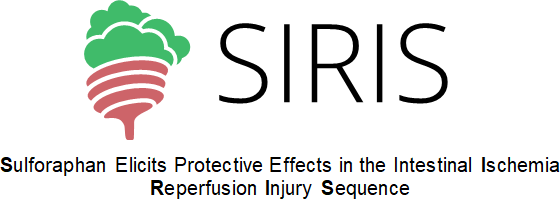- Sulforaphane Elicits Protective Effects in Intestinal Ischemia Reperfusion Injury
- The isothiocyanate sulforaphane modulates platelet function and protects against cerebral thrombotic dysfunction
- Sulforaphane induces neurovascular protection against a systemic inflammatory challenge via both Nrf2-dependent and independent pathways
A robust inflammatory response is the hallmark event during ischemia reperfusion injury (IRI). In addition, a pro-thrombotic state is typically associated with inflammation. Growing evidence suggests that in particular platelets play a crucial part in the integration of the inter-dependent processes inflammation and thrombosis/coagulation. As such, platelets are suggested to be involved in modulating the inflammatory phenotype by amplifying inflammation-induced trans-endothelial leukocyte recruitment and activation
One compound known to affect the crosstalk between leukocytes, platelets and the endothelium and their role in the development and perpetuation of inflammation, is the naturally occurring isothiocyanate sulforaphane (SFN). SFN has also been shown to reduce platelet activation and block adhesion molecule expression, resulting in reduced leukocyte adhesion and hence decreased inflammation. As such, SFN is a promising pharmacological agent to ameliorate IRI. We hypothesize that the naturally occurring isothiocyanate SFN is a promising pharmacological agent to ameliorate intestinal IRI by reducing leukocyte adhesion as the key feature of IRI-elicited inflammation resulting in reduced immune-mediated enterocyte destruction and preservation of epithelial barrier function
Currently, our group focuses on the role of leukocyte- adhesion and subsequent immune-mediated enterocyte destruction elicited by IRI and aims to investigate the protective effect and mechanism of action of SFN in a model of intestinal IRI coupled with real-time imaging of these cellular interactions using intravital fluorescence microscopy (IVM) (Figure 1).




